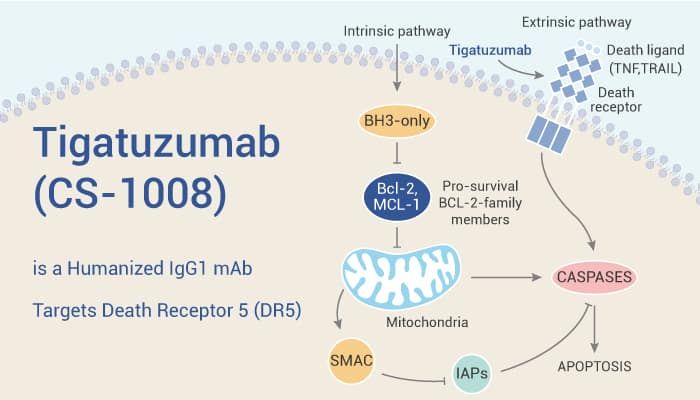Tumor necrosis factor-related apoptosis-inducing ligand (TRAIL), a member of the TNF superfamily of cytokines, is a type 2 membrane protein expressed in the majority of normal tissues. TRAIL can undergo protease cleavage, resulting in a soluble form able to bind to TRAIL death receptors (DRs). Moreover, TRAIL induces apoptosis in tumor cells via intrinsic and extrinsic apoptotic pathways by binding proapoptotic death receptors, TRAIL-R1/DR4 and TRAIL-R2/DR5, and activating procaspase-3/-10. In addition, TRAIL or TRAIL agonists bind to death domain-containing DRs, DR4 or DR5, and form a death-inducing signaling complex (DISC). What’s more, high expression of DR5 is frequently observed in various human cancers including breast cancer.
Tigatuzumab (also known as CS-1008) is a humanized IgG1 monoclonal antibody targeting death receptor 5 (DR5).

Tigatuzumab has selective cytotoxicity toward tumor cells expressing DR5. In addition, Tigatuzumab is a TRAIL-R2 agonist. Besides, Tigatuzumab consists of the complementarity-determining region of the murine antibody and the variable region framework and constant regions of human immunoglobulin IgG-1 mAb58’CL. Tigatuzumab induces cell apoptosis of cancer cells and inhibits tumor growth in vivo. For example, Tigatuzumab induces cytotoxicity, caspase activation and apoptosis in pancreatic cancer cells. Moreover, this compound also increases TRAIL-R2 mRNA and protein expression in pancreatic cancer cells but not normal fibroblast cell. Furthermore, in the orthotopic pancreatic cancer mouse model, Tigatuzumab (i.v) shows antitumor efficacy. Overall, Tigatuzumab has the potential for pancreatic cancer, colorectal cancer, non-small cell lung cancer, and ovarian cancer research.
To sum up, Tigatuzumab, a humanized IgG1 anti-DR5 monoclonal antibody, is aTRAIL-R2 agonist, with potent anticancer effects.
References:
[1] Yamamoto J, et al. Cancer Lett. 2020 Nov 1;492:174-184.
[2] Andres Forero-Torres, et al. Clin Cancer Res. 2015 Jun 15;21(12):2722-9.